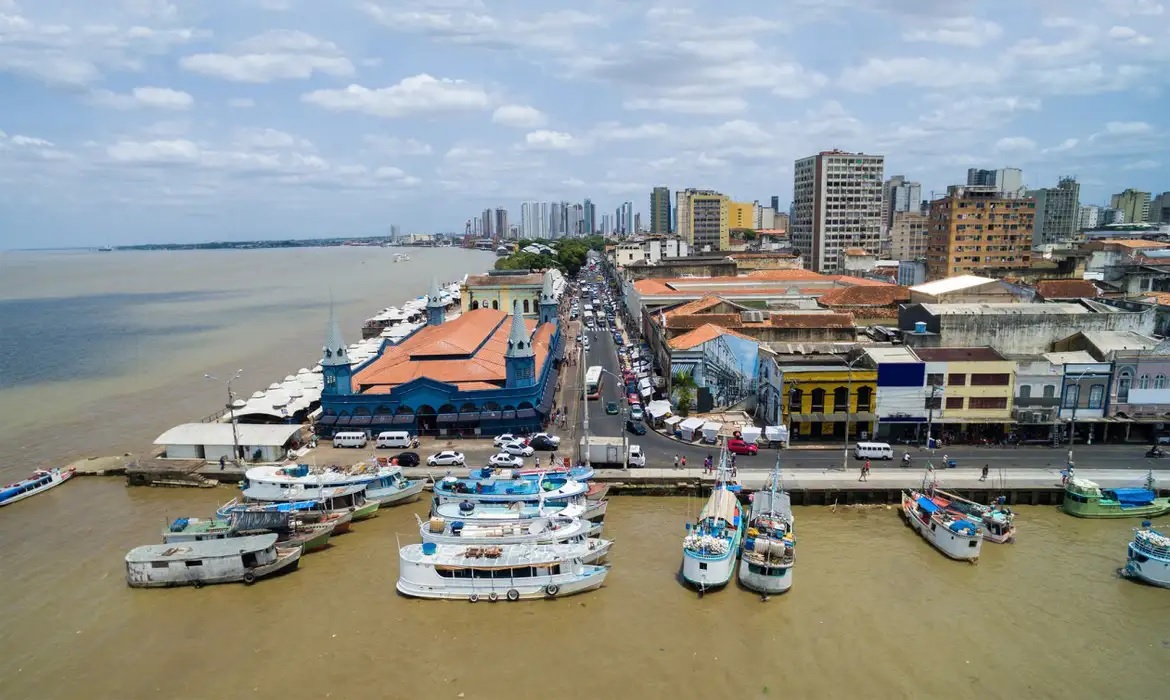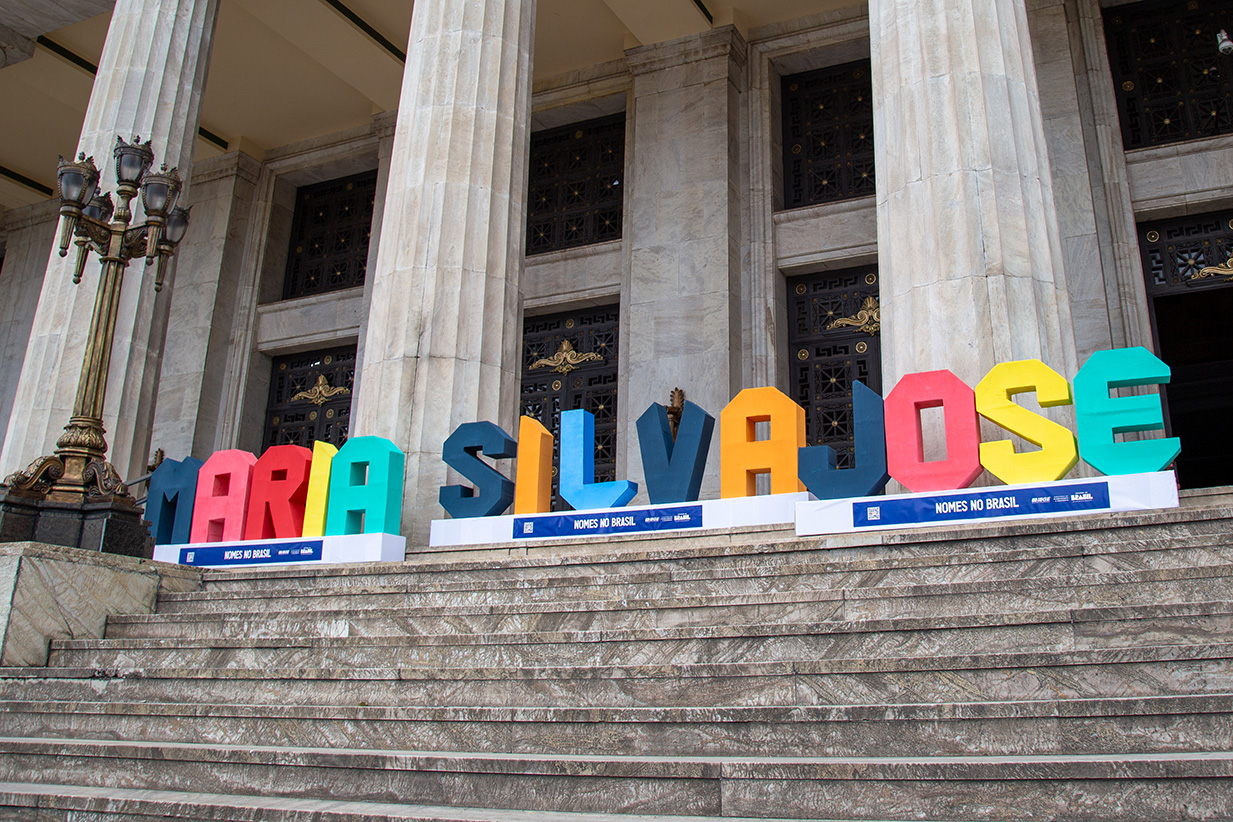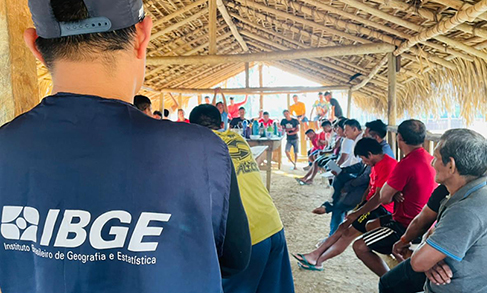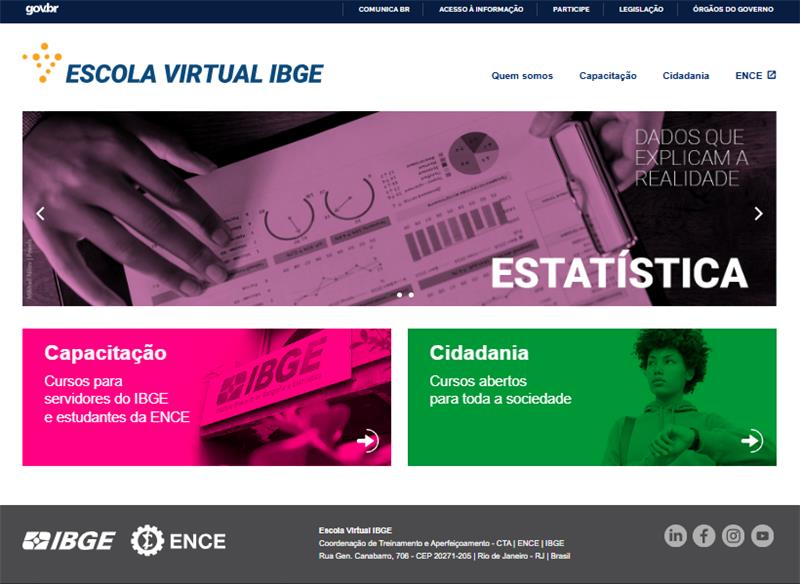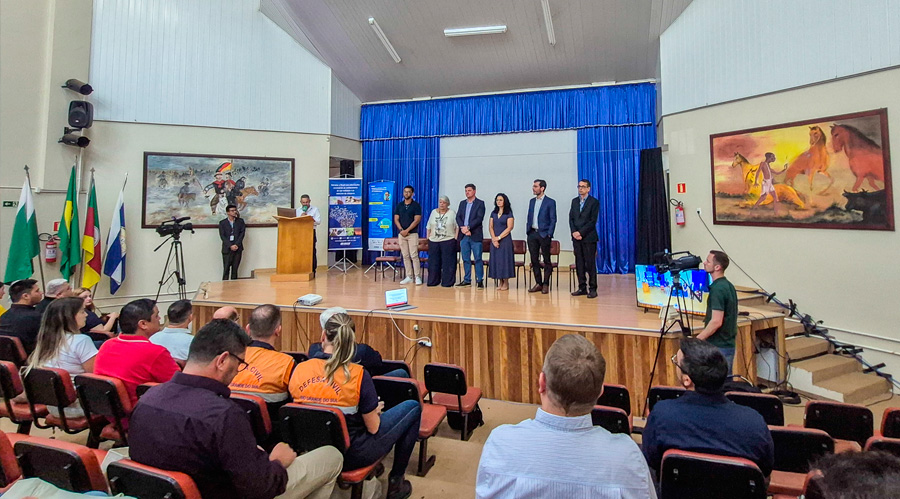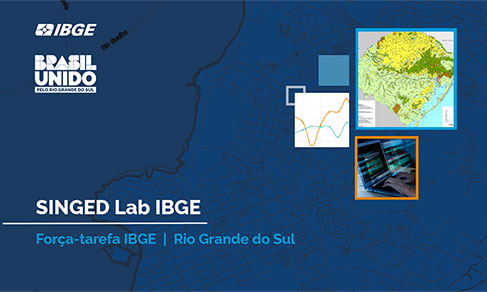In Brasília
Eight institutions join IBGE and SERPRO's program to strengthen predictive public policies
June 24, 2025 06h18 PM | Last Updated: June 26, 2025 12h39 PM
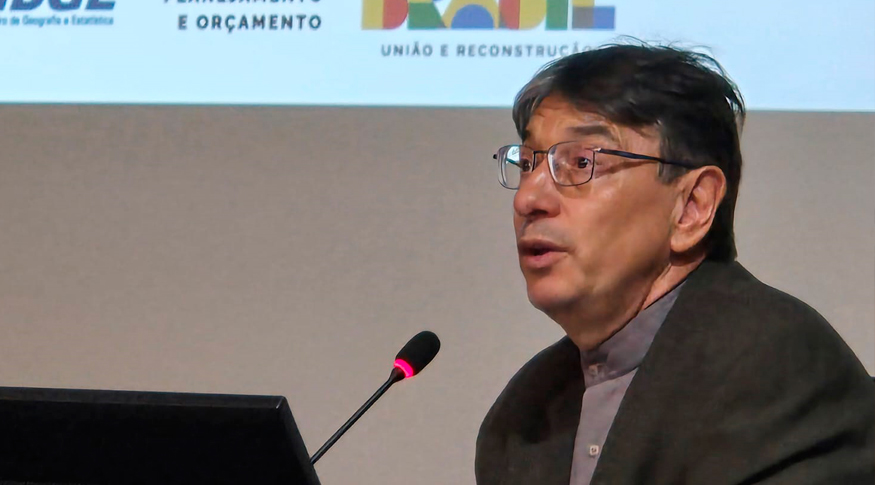
The Brazilian Institute of Geography and Statistics (IBGE), in partnership with the Federal Data Processing Service (Serpro), launched this Tuesday (24), in the auditorium of Serpro's headquarters in Brasília, the National Program of Geoscientific and Statistical Governance and Intelligence to support predictive public policies.
The event was attended by the president of the IBGE, Marcio Pochmann, the director of Economic and Financial Affairs at Serpro, Ariadne Fonseca, as well as authorities, managers and specialists, and was marked by the announcement of eight federal public agencies joining the Program. The event was broadcast by Digital IBGE.
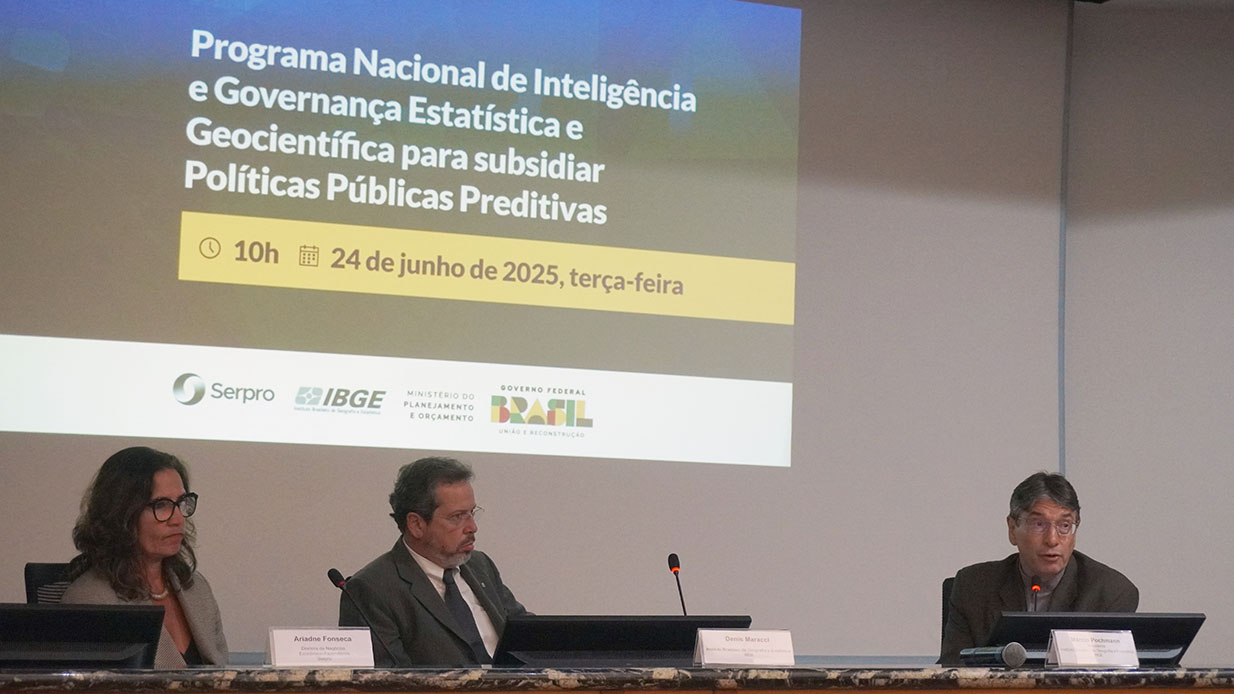
The initiative proposes a new approach to the use of statistical and geoscientific data, focusing on the anticipation of future scenarios. With the support of advanced technologies and predictive analysis, the program seeks to strengthen the State's ability to identify problems and opportunities, offering a more solid basis for the formulation of effective, sustainable public policies aimed at the medium and long term.
The president of IBGE, Marcio Pochmann, stated that the event represents a milestone in the relationship between different spheres of government in favor of innovation in public policies. “We are talking about seven ministries, ranging from the Ministry of Foreign Affairs to the Ministry of Social Development and Planning — ministries committed to public policies and that want to innovate through the information that IBGE will be able to offer in a consistent manner, based on access to and integration of databases to which we do not have access at present,” he said.

Pochmann also highlighted that the initiative represents a significant change in the way public policies are developed in Brazil. “In general, the public policies we have in the country are based on the observed reality, that is, a reality that has already been consolidated in the past or in the recent present. Now, we will be able to present statistical and geoscientific information that better prepares institutions to intervene in a changing reality,” he added.
The project is part of a broader effort by the federal government and is aligned with the proposal of the Sovereign National System of Geosciences, Statistics and Data (Singed), , coordinated by the IBGE. Singed aims to integrate and standardize records that are currently scattered across different public institutions, transforming information into reliable predictive statistics.
Serpro’s Director of Economic and Financial Affairs, Ariadne Fonseca, highlighted the importance of the partnership with IBGE, which, according to her, represents technical excellence in the production of statistics and geosciences in the country. “We are bringing together two major institutions with decades of history in favor of the public and the improvement of the country,” she stated. Ariadne emphasized that Serpro brings into the program its technological robustness, information security and expertise in processing large volumes of data with advanced computational models. For her, the initiative reaffirms the commitment to public innovation and the use of technology as a tool to generate development, inclusion and smarter public policies.
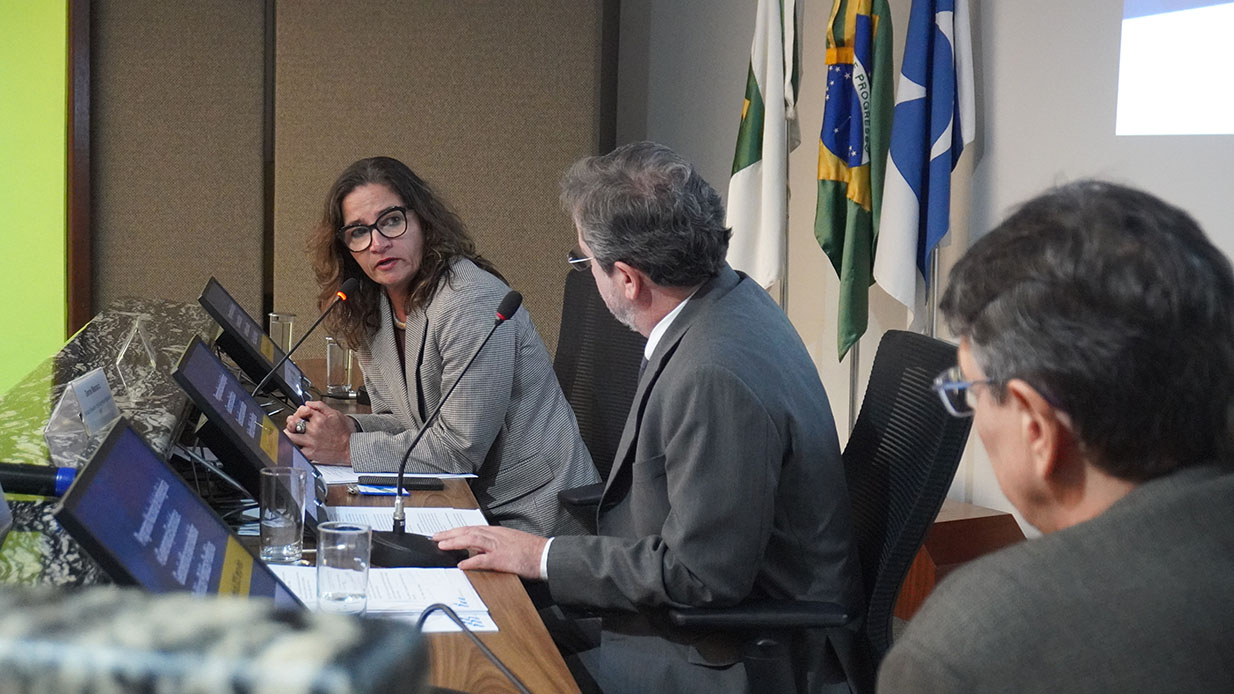
Focused on the 2025–2026 biennium, the program aims at the development of strategic analytical platforms that concentrate and process large volumes of data from different areas and agencies of the public administration. The expectation is to generate information that guides government decisions based on evidence and projections, increasing the accuracy of national planning.
The Secretary of Institutional Relations of the Ministry of Planning and Budget (MPO), João Villaverde, highlighted the strategic importance of IBGE for the country and celebrated the signature of the protocol with the Institute and Serpro. “Brazil needs more from the IBGE, not less. Brazil needs to see that vest of the IBGE census taker and open the door of their homes with joy,” he said. Villaverde emphasized that essential information for the formulation of public policies — such as inflation, unemployment and the population's living conditions — is only possible thanks to the work of IBGE. “Whether for the public, private or third sector, it is only possible to make efficient decisions with good information and in a timely manner”, he added.
The Deputy Secretary of Industrial Development, Innovation, Trade and Services of the Ministry of Development, Industry, Trade and Services (MDIC), Luis Felipe Giesteira, highlighted the importance of the initiative for the growth and update of the industrial sector in the country.
During the ceremony, the president of the National Institute of Social Security (INSS), Gilberto Waller Júnior, celebrated the launch of the program, highlighting its relevance to the agency's activities. “As I started ahead of the INSS, I had the pleasure of talking to Marcio Pochmann, when he presented the program that is being launched today. And when he spoke, I immediately thought to myself: this was made for the INSS. It directly addresses our challenges,” stated Waller, reinforcing the harmony between the initiative and the demands of the INSS.
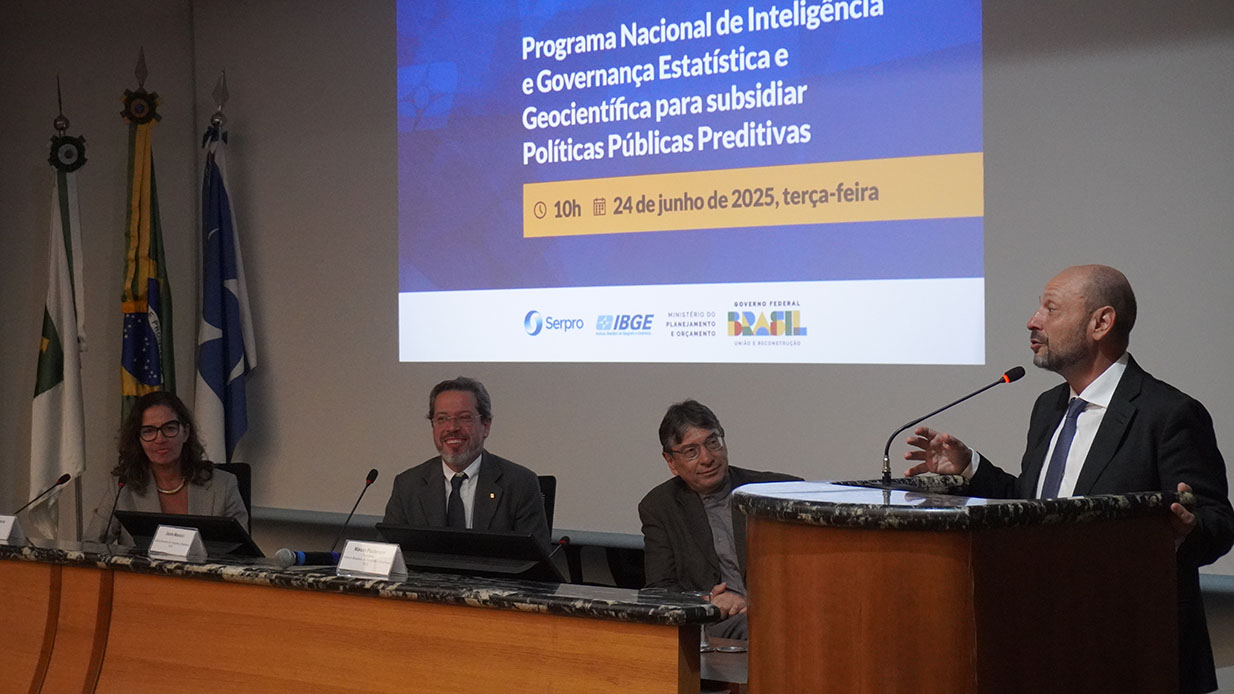
The deputy minister of Social Development and Fight Against Hunger, Osmar Júnior, stated the ministry’s enthusiasm for joining the program. He highlighted the strategic role of the IBGE in consolidating data sovereignty and in building policies based on solid information. “The IBGE is part of an important moment in Brazil’s history, comparable to milestones such as the Empire, the 1930 Revolution and now, the era of data sovereignty,” he stated.
The undersecretary at the Ministry of Labor and Employment (MTE), Paula Montagner, highlighted the importance of accurate and timely territorial information to ensure the effectiveness of equality policies in the labor market. “Good information that arrives three years later is almost useless. We need data with credibility and timing,” he said.
The secretary of the Consular Department of the Itamaraty, Bruno Abreu, celebrated the partnership as a step forward in the modernization of the Brazilian consular system. “We need to transform estimates into data. Today we estimate 4.9 million Brazilians abroad, but we need to know precisely,” he described.
Manuel Fernando Melo, president of the Anísio Teixeira National Institute for Educational Studies and Research (INEP), highlighted the long-standing collaboration with the IBGE and the importance of the program in improving population estimates and educational projections, which are essential for planning professional and technological education.
Pedro Tourinho, president of the Jorge Duprat Figueiredo Foundation for Occupational Safety and Medicine (Fundacentro), stressed the need to deepen knowledge about work-related accidents and illnesses. “This partnership with the IBGE and Serpro will help us overcome the concealment of these data and qualify the information for decent work policies,” he commented.
At the end of the ceremony, the advisor to the IBGE Presidency, Denis Maracci, announced that the program’s workshops are scheduled to begin in July, with the schedule to be defined in the coming weeks. “This is already a demonstration of the commitment of everyone involved to make this happen,” he stated. He also reported that an official website will be launched to monitor the program's actions, reinforcing the commitment to transparency and institutional participation. According to him, other entities have already shown interest in joining the initiative, which indicates the project's relevance and potential for expansion.
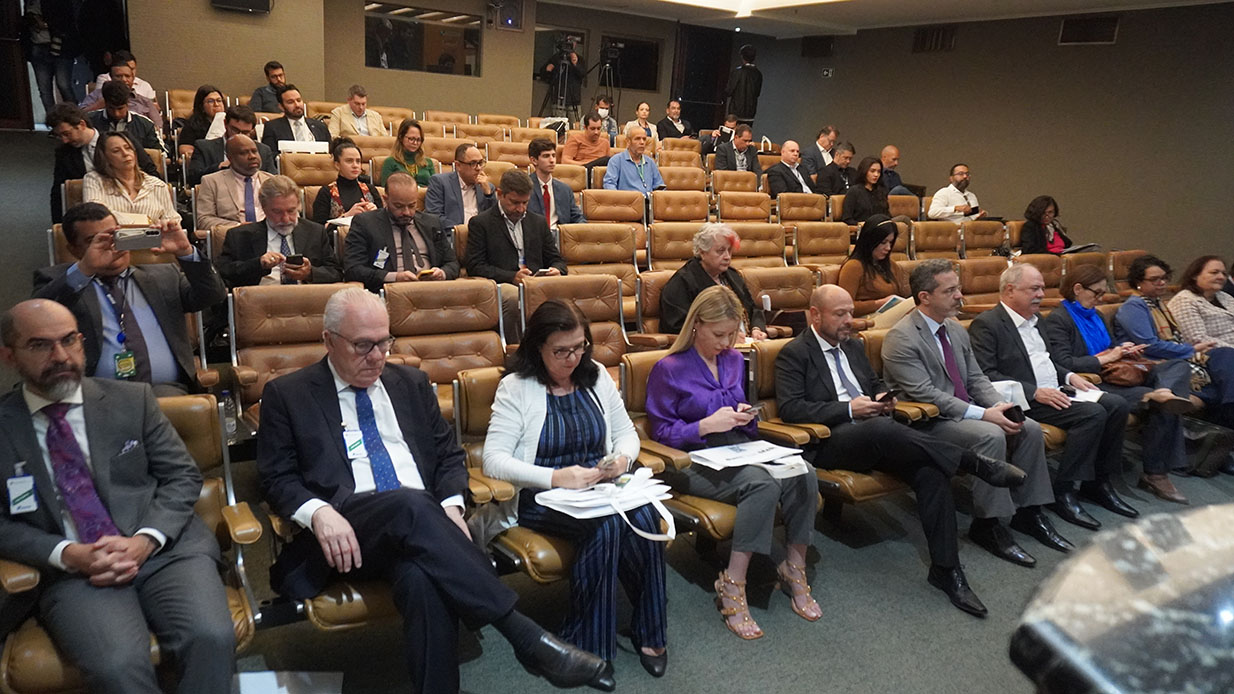
National Program of Geoscientific and Statistical Governance and Intelligence to Support Predictive Public Policies
The Brazilian Institute of Geography and Statistics (IBGE) is currently responsible for almost 60% of the 154 years of existence of the Official Statistical System, which began in 1871 with the creation of the Directorate-General of Statistics (DGE). Over the past 9 decades, IBGE has contributed to the institutional mission of portraying Brazil with information necessary for understanding its reality and exercising citizenship.
In the midst of the transition to the Digital Age, IBGE has sought to reorganize its actions in the face of the advance of statistical misinformation and the weakening of national data sovereignty. To this end, it has sought to be in line with the set of international statistical recommendations that point to the integration of databases and the use of artificial intelligence and data science, as conferred by the 56th session of the United Nations Statistical Commission, the 12th Conference of the Statistical Commission of the Americas of ECLAC, the 73rd plenary session of the Conference of European Statisticians of UNECE, the 17th meeting of the Heads of National Statistical Institutes of BRICS and the 14th meeting of the Heads of National Statistical Institutes of Portuguese-language countries.
In this respect, IBGE has sought to work in line with the Federal Government, which, through the Conecta GOV.BR program of the Ministry of Management and Innovation in Public Services (MGI), allows and facilitates the integration of different databases through Application Programming Interfaces (APIs). The cooperation agreement between the IBGE and SERPRO also opened up the opportunity for partnerships that enable access to different federal databases, which is necessary to strengthen the current short-term and long-term surveys of Brazil's largest public survey institution.
But to this end, the IBGE 90th Anniversary Project implemented in 2023 aimed to prepare the institutional repositioning through internal dialogues. By 2025, for example, three National Meetings of Civil Servants (ENS) had already been held, the first of which, in 2023, defined the Institution's new Guidelines for the period 2023-2026, followed by the second ENS, in 2024, focused on the elaboration of SINGED and the third ENS, in 2025, committed to the reestablishment of the General Plan for Statistical and Geographical Information, after half a century of its non-existence, as well as the annual introduction of the institution's Integrated Work Plan.
Furthermore, it is also important to highlight the conduction, by the IBGE, of the National Conference of Data Producers and Users in 2024 and the coming edition in 2025, both aimed at building SINGED together with the national and international epistemic community. In this respect, the international recognition achieved by the institutional repositioning underway, and the election of IBGE by the United Nations Economic and Social Council (ECOSOC) to represent Brazil before the United Nations Statistical Commission, the world elite of national official geography and statistics institutions.
Last but not least, the set of initiatives effected over the years by the IBGE itself, both in the use of population projections with demographic methods and the experimental research adopted in the integration and pairing of databases in cyclical and structural research with civil registries, postal and Aneel records, school the census, CadÚnico, RAIS, CNPJ, among many others, are recovered and valued.
More recently, significant contributions to the progress of the new statistical and geographic frontier established by the Digital Age and the transition to a low-carbon economy have been led by the IBGE’s National School of Statistical Sciences (ENCE).
A highlight, for example, is the Artificial Intelligence and Public Policies Project, which is underway with the participation of the Center for Applied Studies and Research in the Public Sector (Cepapsp) of the Federal University of Goiás and the Center for Public Policy Studies of the State University of Campinas. It currently has more than 22,000 articles and studies, a base of just over a thousand users of the ChatPP Assistant and more than 2,000 persons trained in courses on the use of Indicators and the Population Census in Municipal Planning focused on local challenges, plans and scenarios for regional development in Brazil.
Likewise, the Sociodemographic, Economic and Environmental Dynamics in Brazil Project based on the 2022 Population Census is underway with the cooperation of researchers from ENCE and the Brazilian College of Advanced Studies at UFRJ. It has the support of resources from CNPq to analyze regional, ethnic-racial, gender, education, poverty, labor market, internal migration and other issues of multiple contemporary complexity to meet the demands of elaborating future scenarios in the country with adequate financial support.
In this context, the Public Data Integration and Municipal Demographic Statistics Project developed within the scope of ENCE aims to experimentally produce annual population estimates by age group and sex for all Brazilian municipalities based on the integration of data from the Civil Registry, Vital Statistics, National Address Registry for Statistical Purposes and Demographic Censuses. With intensive use of multiple data sources, the project experiments the use of adjustment techniques and demographic models that improve annual estimates for all municipalities in the country and for the target audience of public policies, such as children, teenagers and young people for basic education and for vaccination services and basic health care, as well as the production of mobility estimates of the active and elderly population in the national territory.
Consequently, the Cohort of 300 Million Brazilians Project constitutes an advanced longitudinal experiment in the anonymized individual data of the country's residents as recorded in the last four Population Censuses (1991, 2000, 2010, 2022). Through this, the preparation of the testable structure of the integration of a diverse set of data sources and administrative records (Civil Registry, Unified Registry of Social Programs, School Census, Social Security Beneficiary Database, etc.) prepares both the upcoming 2030 Population Census and the unprecedented production of indicators on the main social changes, effects of public policies and population estimates for different territorial divisions, between censuses and after censuses, which can be applied in expansion factors of household surveys.
In this context, the Project Projections of the Workforce and Occupations for Brazil 2040 is committed to developing and experimentally applying a methodology for projecting the workforce and occupational groups in the country for the next 15 years, in accordance with the longitudinal basis of the Population Census and the Continuous National Household Sample Survey, specific to the IBGE Population Projections and the Prospective Scenarios produced by the Ministry of Planning and other government agencies. To this end, it considers demographic determiners, socioeconomic conditions, public policy scenarios and technological impacts brought about by the spread of Artificial Intelligence (AI), capable of estimating, for example, both the target audiences of Technical Education, Higher Education and Professional Specialization programs, as well as the anticipation of possible impacts of AI and new technologies on the labor reality in Brazil.
In short, IBGE’s repositioning, briefly attested by the brief description above, further adds value to the SINGED construction chain through the implementation of the National Program of Geoscientific and Statistical Governance and Intelligence.
With the recent transformation of the IBGE into a Science and Technology Institution, recognized by the Ministry of Science, Technology and Innovation (MCTI) due to its teaching and research activities, the institute is strengthened in the production of knowledge and technical innovation, assuming the condition of a national and global reference center in the research and development segment.
After its conception and long internal preparation with professionals from the IBGE, the presentation and discussion with the Board of Directors and the forum of senior management represented by directors, Superintendents and Coordinators, the National Plan is becoming a reality. To this end, and simultaneously with the recreation, after more than two decades, of the Technical Council, now with representatives of the presidency of the Republic, ministries and society, the IBGE takes another fundamental step towards institutional modernization in the face of the gigantic challenges posed by the Digital Age.






